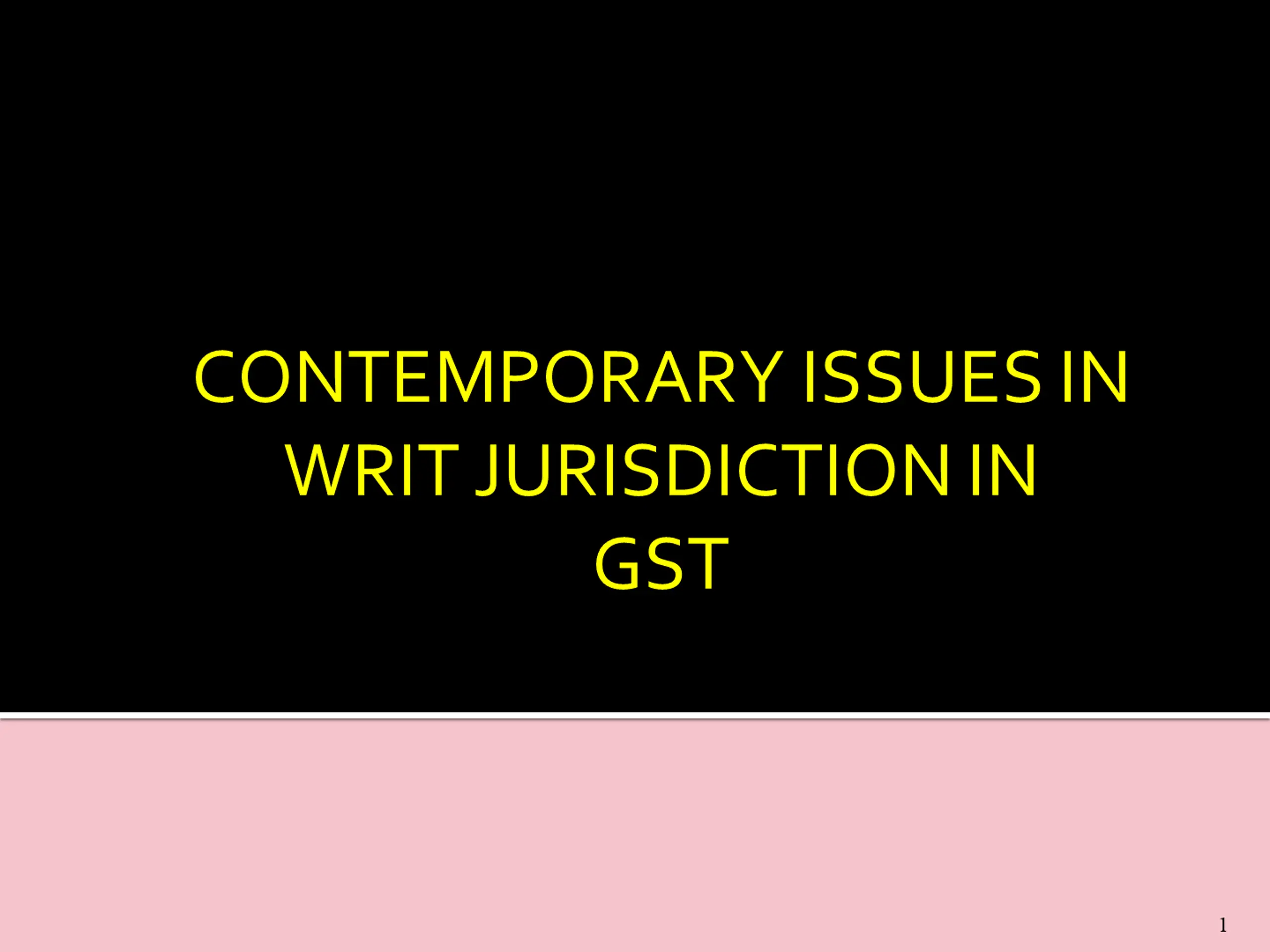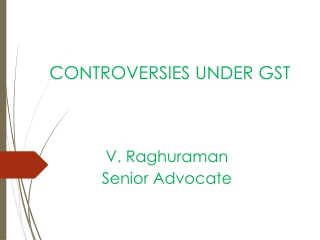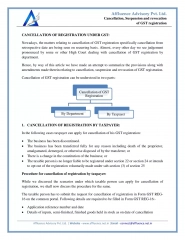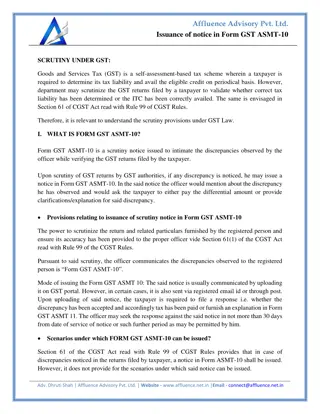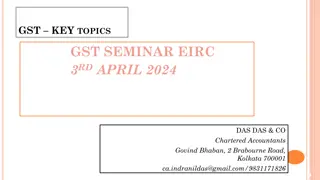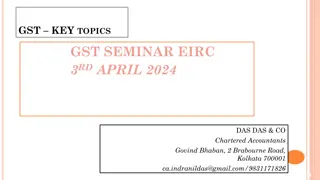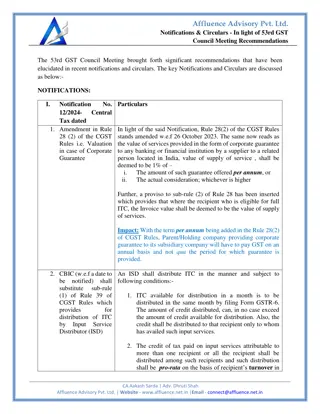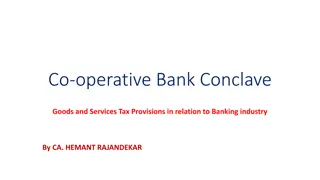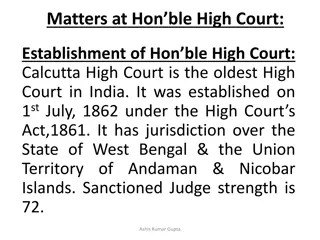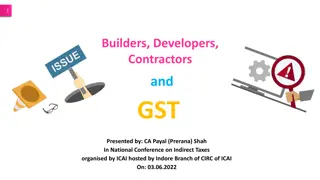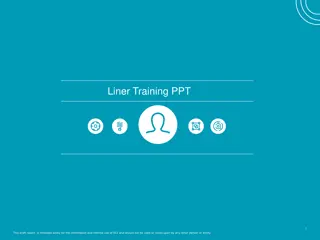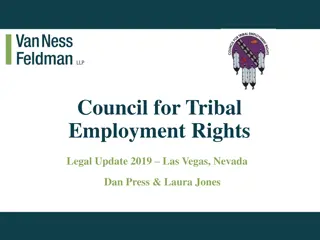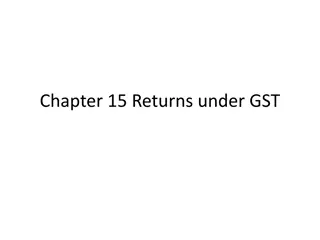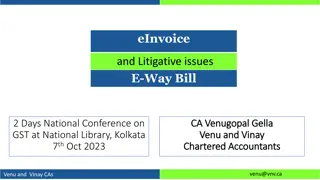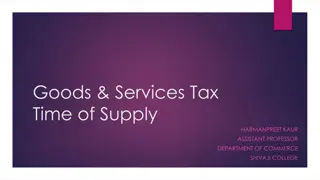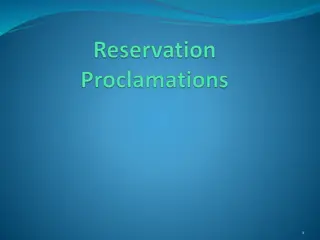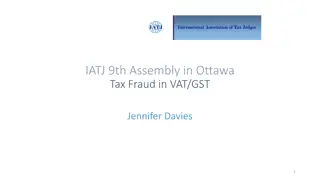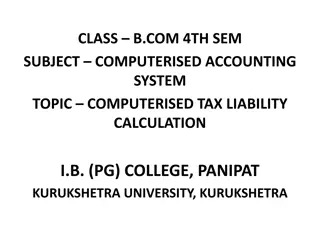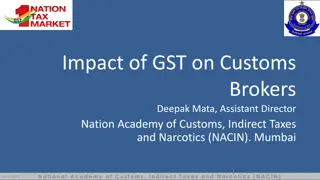Contemporary Issues in Writ Jurisdiction in GST
The use of writ jurisdiction to enforce rights in GST and the powers of the High Court under Article 226 of the Constitution of India. Examining cases and circumstances where writ jurisdiction can be invoked.
Download Presentation

Please find below an Image/Link to download the presentation.
The content on the website is provided AS IS for your information and personal use only. It may not be sold, licensed, or shared on other websites without obtaining consent from the author.If you encounter any issues during the download, it is possible that the publisher has removed the file from their server.
You are allowed to download the files provided on this website for personal or commercial use, subject to the condition that they are used lawfully. All files are the property of their respective owners.
The content on the website is provided AS IS for your information and personal use only. It may not be sold, licensed, or shared on other websites without obtaining consent from the author.
E N D
Presentation Transcript
CONTEMPORARY ISSUES IN WRIT JURISDICTION IN GST 1
Writ can be filed to enforce rights against action as well inaction of any person or authority performing public duty. Where a fundamental right is involved, a party should be free to approach either High Court or Supreme Court under Article 226 or Article 32 of the Constitution of India. The power of the High Court to issue writs under article 226 is wider than that of the Supreme Court. It is not confined to fundamental rights, but extends to all cases where the breach of a right is alleged. The writ may be issued for the enforcement of fundamental rights of for any other purpose. The powers conferred upon the High Court under article 226 are discretionary in nature which can not be invoked if there is efficacious alternative remedy. The remedy of writ is extraordinary and discretionary. The remedy under the statute, however, must be effective and not a mere formality with no substantial relief. Court in exercise of its jurisdiction under Art. 226 of the Constitution will interfere with a show cause notice in the following circumstances: (1) When the show cause notice ex facie or on the basis of admitted facts does not disclose the offence alleged to be committed; (2) Lack of jurisdiction; (3) When the show cause notice is contrary to judicial decisions or decisions of the Tribunal; (4) Prejudice by denial of cross-examination of witnesses. 2
Oryx Fisheries Pvt. Ltd. v. Union of India 2011 (266) E.L.T. 422 (S.C.) - while reading a show-cause notice the person who is subject to it must get an impression that he will get an effective opportunity to rebut the allegations contained in the show cause notice and prove his innocence. An appealable order in original can be challenged in writ jurisdiction in following circumstances:- if the authority concerned has acted in breach of principles of natural justice or if the impugned order is non-speaking; where the statutory authority has not acted in accordance with the provisions of the enactment in question or has resorted to invoke the provisions which are repealed; where the vires of an Act, Rules, Circular, Notification, Public notice is challenged; if the impugned order is without jurisdiction; where alternate remedy being ineffectual or not efficacious; writ jurisdiction can be exercised to reduce mandatory pre-deposit in deserving cases. On a combined reading of clauses (1) and (2) of article 226, one can say that writ can be issued against a Government, person or authority if (a) its seat is within the High Court s jurisdiction, or (b) the cause of action has arisen, wholly or in part, within the High Court s jurisdiction. 3
Many taxpayers could not file their GST Tran 1 return due to technical glitches of the portal or inadvertently omitted to file or their was some error in filing. In the case of Siddhartha Enterprise 2019 (29) G.S.T.L. 664 (Guj.) it has been held that the right to avail such credit a substantive right and cannot be allowed to be lapsed by application of Rule 117 on failure to file necessary forms within due date prescribed therein. Such prescription in violation of Article 14 of Constitution of India. Denial of credit against doctrine of legitimate expectations. Such action also in violation of Article 19(1)(g) as it would affect working capital of assessees and diminish their ability to continue with business. Cenvat credit earned under erstwhile Central Excise Law being property of assessees cannot be appropriated on mere failure to file declaration in absence of Law in this respect and Government should have provided for it Act and not have taken it away by virtue of merely framing Rules in this regard. Due date contemplated under Rule 117 ibid for purposes of claiming transitional credit is procedural in nature and should not be construed as mandatory provision. Hon'ble Delhi High Court in the case of Brand Equity Treaties Ltd. [2020] 116 taxmann.com 415 (Delhi) held that Time limit prescribed in Rule 117 is not sacrosanct, Vested right cannot be taken away merely by way of delegated legislation by framing rules, Mechanism for availing credit under as per rule 117 is procedural and directory, "Technical difficulty" is too broad a term and cannot have a narrow interpretation, or application, further, technical difficulties cannot be restricted only to a difficulty faced by or on the part of the respondent. It would include within its purview any such technical difficulties faced by the taxpayers as well, which could also be a result of the respondent's follies. It is very unfair on the part of the respondents, in these circumstances, to expect that the taxpayers should have been fully geared to deal with the new system on day-one, when they themselves were completely ill- prepared, which led to creation of a complete mess. A period of three years from the appointed date would be the maximum period for availing of such credit. 4
There are many High Courts which gave ruling in favour of the taxpayers seeking such relief which ultimately led the Government to amend the law retrospectively. After several favorable verdicts of the Hon'ble High Courts giving relief to the taxpayers to claim transition credit, the Government has made the amendment in Section 140 by giving power to prescribe the time limit for availing transition credit. In my opinion, the said amendment does not negate all such judgments. Hon'ble Delhi High Court in the case of Skh Sheet Metals Components v. UOI & Ors. pronounced on 16th June, 2020 has held that, no matter how well conversant the taxpayers may be with the tax provisions, errors are bound to occur, therefore, taxpayer should not be criticized and the solution should be found, there is no specific challenge to the amendment introduced by Section 128 of the Finance (Amendment) Act, 2020, we do not want to venture into legality of the said provision viz-a- viz the judgment of Brand Equity, Decision in case of Brand Equity in not 'merely' based on grounds of time limit and therefore continue to apply with full rigour even today, regardless of amendment to Section 140 of the CGST Act. The SLP preferred in the matter of Union of India & Ors. v. Adfert Technologies Pvt. Ltd.) [2020 (34) G.S.T.L. J138 (S.C.), which had extensively quoted from Siddhartha Enterprise judgment has been dismissed by the Hon ble Supreme Court. SLP preferred in the matter of Union of India v. Chogori India Retail Ltd. - [2020] 117 taxmann.com 54 (SC) has also been dismissed. Supreme Court has stayed Delhi HC decision. What next? 5
Honble Gujarat High Court in Shabnam Petrofils (P) Ltd Vs UOI - 2019 (29) G.S.T.L. 225 (Guj.) struck down Notification No. 20/2018-C.T. (Rate), dated 26-7-2018 and C.B.I. & C. Circular No. 56/30/2018-GST, dated 24-8-2018 to the extent that it provided that the input tax credit lying unutilized in balance, after payment of tax for and up to 31-7-2018, on the inward supplies received up to 31-7-2018, shall lapse. This judgment can be referred to challenge Notification No. 03/2019-Central Tax (Rate) datedthe 29th March, 2019 asking for reversal of credit in order to opt for new rate of tax w.e.f. 01.04.2019. The Hon ble Bombay High Court in the case of Bai Mamubai Trust v. Suchitra reported in [2019] 109 taxmann.com 300 (Bombay) has held that liquidated damages are not taxable under GST on the ground that where no reciprocal relationship exists, and the plaintiff alleges violation of a legal right and seeks damages or compensation from a Court to make good the said violation (in closest possible monetary terms) it cannot be said that a 'supply' has taken place. The Madras High Court in Revenue Bar Association vs Union of India 2019 (30) G.S.T.L. 584 (Mad.) has ruled that the constitution of GST Appellate Tribunal ( GSTAT ) is unconstitutional in the absence of judicial member. Hon ble Supreme Court in the case of Columbia Sportswear Company vs. Director of Income-tax, Bangalore) reported in (2012) 11 SCC 224 had held that Authority for Advance Ruling (AAR) is a tribunal within the meaning of the expression in Articles 136 and 227 of the Constitution. Constitution of AAR is also under challenge in the absence of a judicial member. 6
Honble Gujarat High Court in Mohit Minerals Pvt. Ltd. Vs UOI - 2020 (33) G.S.T.L. 321 (Guj.) held that the Notifications levying tax on supply of ocean freight service and making the importer of goods as the person liable for paying the tax are unconstitutional as there is no statutory sanction for levy and collection of such tax. Hon ble Gujarat High Court in AAP and Co Vs UOI - 2019 (26) G.S.T.L. 481 (Guj.) had set aside the press release dated 18th October 2018 as the same found to be illegal to the extent that its para-3 purports to clarify that the last date for availing input tax credit relating to the invoices issued during the period from July 2017 to March 2018 is the last date for the filing of return in Form GSTR-3B. Monthly return GSTR-3B is not a substitute of monthly return GSTR-3 and it is not a return under Section 39(1) of Central Goods and Services Tax Act, 2017 read with Rule 61(1) of Central Goods and Services Tax Rules, 2017 . SC has stayed this judgment and Rule 61(5) has retrospectively amended to provide that GSTR 3B is a return under Section 39(1). Hon ble Madras High Court in Sutherland Global Services Pvt. Ltd. Vs Asstt. Commr. of CGST and C. Ex., Chennai - 2019 (30) G.S.T.L. 628 (Mad.) has allowed the Transitional Credit of Education Cess, Secondary and Higher Education Cess and Krishi Kalyan Cess into the Goods and Services Tax ( GST ). Hon ble Orrisa High Court in Safari Retreats (P.) Ltd. v. Chief Commissioner of CGST [2019] 105 taxmann.com 324 (Orissa) allowed ITC on goods/services used in construction of mall to be used against GST payable on rental income. 7
Pending refund of ITC arising on account of export or inverted tax structure; Recredit of rejected refund of ITC arising on account of export or inverted tax structure; Interest or compensation on delayed refund of ITC arising on account of export or inverted tax structure; Challenge to vires of Rule 89(5) of the CGST Rules, which does not allow refund of ITC on input services and capital goods in the case of inverted tax structure Challenge to vires of Rule 89(4) of the CGST Rules, which does not allow refund of ITC on capital goods in the case of exports; Constitutional validity of Notifications and Circulars levying GST after 01.03.2019 on development rights on unsold stock on the date of issue of completion certificate under reverse charge mechanism on the developer; Constitutional validity of Notifications and Circulars levying GST on development rights prior to 01.03.2019 on the landowner; Any issues arising out of technical glitches on the common portal. Constitutional validity of Section 16(2)(c) of the CGST Act which seeks to deny ITC to a buyer of goods or services, if the tax charged in respect of supply of goods or services has not been actually paid to the Government by the supplier of goods or services; 8
Demand for reversal of ITC under Section 16(4) of the CGST Act for credit availed after the due date of furnishing of the return under section 39 for the month of September following the end of financial year to which such invoice or debit note pertains or furnishing of the relevant annual return, whichever is earlier; Constitutional validity and vires of Section 43A(4) of the CGST Act and Rule 36(4) of the CGST Rules, to the extent that it seeks to restrict ITC available to a buyer of goods or services to the extent of 10% of the eligible credit, if invoices are not uploaded by the suppliers on the portal; ITC blocked on portal by the department for non payment of tax or non filing of return by supplier; Constitutional validity of Section 28 of the Central Goods and Services Tax (Amendment) Act, 2018 which seeks to retrospectively disallow the transition and carry forward of CENVAT Credit of EC, SHEC and KKC into the GST regime. Freezing of bank accounts in the course of any enquiry/investigation proceedings. Notice demanding reversal of ITC for availing credit after date prescribed in Section 16 of the CGST Act. Seizure/confiscation of goods or conveyances and levy of penalty and /or fine in lieu of confiscation without following due process of law. Anticipatory bail/bail/ prevention of coercive measures in the course of any enquiry/investigation proceedings. 9
